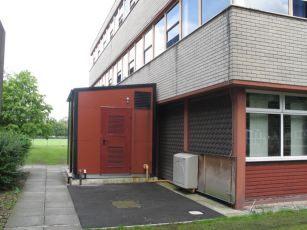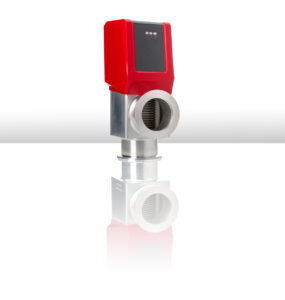Lancashire Constabulary Cuts Energy Costs with Armstrong Packaged Plant Rooms
By replacing its old oil-fired boiler house, with four new Armstrong offsite manufactured packaged plant rooms, Lancashire Constabulary has reduced the energy bills for the Hutton Hall site by £245,633 per annum.

Lancashire Constabulary (Picture: Armstrong)
It has also reduced CO2 emissions by 744 tonnes a year. Offsite manufacture enabled the new system to be installed within an extremely tight timescale (which would have otherwise meant site occupants being without heating and hot water in the winter months).
Lancashire Constabulary has responsibility for 220 buildings, including police stations and operational centres with an annual energy bill approaching £500,000 per year.
The system for supply of heating and hot water at one of its largest sites, the Hutton Hall Police Training Centre, in Preston, Lancashire, was in urgent need of replacement. The centralised oil-fired boiler, with two calorifiers for hot water supply, had ceased to manage the site’s demand effectively some years previously, necessitating the installation of new heating systems for the accommodation blocks. In 2006, it became necessary to install replacement systems for the remaining buildings at the site, including a sports hall, administrative centre, firing range, dining room and teaching block. The existing system was inefficient, with extensive distribution losses, and engineers advised the Constabulary that the boiler could not meet the needs of the site over the coming winter.
Project priorities
Lancashire Constabulary had a number of priorities. As the site is financed from public funds it was important to reduce the energy costs as much as possible. The energy manager, Ed Palmer, who has developed the Constabulary’s sustainability policy, also wanted to capitalise on the opportunity to improve the energy efficiency and carbon footprint for the estate, and to position the site to meet increasingly stringent environmental legislation. A key part of this strategy involved a move away from oil towards a gas-fired system with reduced carbon impact.
The nature of the operations at Hutton Hall also had an impact on the choice of equipment. The site houses several buildings with 24/7 demand, such as call centres on 24-hour duty, and the National Police Computer Database HQ.
The timescale of the project was such that, once the capital investment was approved, there was insufficient time to carry out the installation (using traditional onsite methods) before the onset of the colder weather. An alternative solution was sought that would ensure continuity of supply of hot water and heating for the site’s occupants.
Armstrong solution
Ed Palmer carried out a feasibility study comparing three alternative approaches. The solution which proved to be the most effective was the installation of four offsite constructed packaged plant rooms, incorporating highly-efficient variable speed systems based around the Armstrong MBS integrated heating solution, controlling Armstrong IVS pumps and pressurisation equipment.
The MBS incorporates fully modulating boilers, variable primary pumps, automatic fill/pressurisation unit and integrated controls, all pre-specified for optimum efficiency, and pre-assembled for rapid installation on site. It enables excellent boiler efficiencies to be achieved and exceeded without time-consuming mixing and matching of system components.
Instead of treating the condensing boiler in isolation, the MBS matches pumps, controls and hydraulic system design. This ensures compatibility of components and enables specifiers to meet and exceed the boiler efficiency levels required under the new Part L of the Building Regulations with energy-efficient, low carbon performance designed into the system as standard.
Part L2 calls for minimum overall boiler efficiencies of 84% in new build and 80% in existing buildings. The MBS can achieve overall seasonal efficiencies of 94%, providing significant energy savings and carbon reductions throughout the lifetime of the plant. As the system is fully integrated and pre-assembled, additional system design input is not necessary, and installation and commissioning can be achieved much more easily and quickly.
Cost savings and energy reductions
A year after the installation of the plant rooms, Lancashire Constabulary has been able to analyse the resulting energy reductions. The energy requirement of the site was reduced from the equivalent of 4,503,600 kWh per year to 2,550,730 kWh per year. A saving of 1,952,870kWh.
The reduction of 1,952,870 kWh in energy consumption, calculated at a cost of 6.5p per kWh (oil) equates to an annual saving of £126,936.55.
As the site has moved away from an oil-fired boiler in favour of highly-efficient condensing boilers there are further reductions in energy costs arising from the prices differences between gas and oil. Calculated based on a gas price of 1.8p per kWh and an oil price of 6.5p per kWh, the cost saving as a result of change of fuel is £118,696.45.
This means that the total cost-saving amounts to £245,633 per annum. It is estimated that the four packaged plant rooms have paid for themselves in one year.
Environmental improvements
The environmental benefits have also bee considerable. Calculated at a rate of 0.27 kg of CO2 per kW, the move to the new system has reduced carbon emissions by 525.27 tonnes per year. As the plant rooms use gas for heating instead of oil, there is a further reduction in carbon emissions resulting from the change of fuel of 217 tonnes of CO2 per year. This amounts to an overall reduction in CO2 emissions of 744 tonnes per year.
Streamlining the project
Constructing the packaged plant rooms off site also had project benefits. The packaged plant rooms were assembled concurrently with the excavations for the gas pipes rather than commencing once this work was completed. This significantly shortened the timescales for the project making it possible to complete it by the target date of the start of October. The installation time was also reduced from several weeks to just a few days. The plant rooms were delivered to site, fully assembled, requiring only final connections.
By completing the project by the target date, it was possible to guarantee continuity of supply of hot water and heating for site occupants. Traditional onsite methods of plant room construction could not have met the target date and would have continued into the winter months.
Finally, manufacturing the plant rooms in a purpose-designed factory instead of at the Hutton Hall site reduced the health and safety risks associated with the project. Contractor presence and traffic at the Hutton Hall site was also reduced.
Ed Palmer, Energy Manager for Lancashire Constabulary said, “It was only when we analysed the energy consumption at the end of the first year, that we realised just how much money the packaged plant rooms had saved the taxpayer. The equipment has paid for itself in just a year, and will continue to deliver cost savings throughout its life.
“In addition, with the timescale we were working to, there simply wasn’t any other way that we could have completed the installation before the onset of cold weather. And being without heating and hot water was not an option.”






